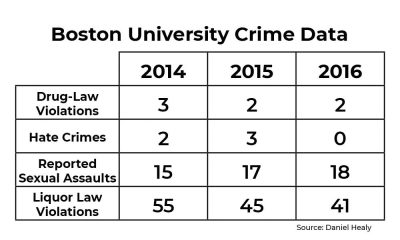
The National Center for Education Statistics released its 20th annual “Indicators of School Crime and Safety” report, a lengthy study of trends in crime at schools and colleges, last Thursday. The study showed that sexual assault, drug-law violations and race-related hate crimes have increased on college campuses.
Daniel Healy, a sergeant at the Boston University Police Department, said BU specifically has seen an increase in the number of sexual assaults reported and a decrease in liquor law violations, in line with the results of the report.
Across the nation, the number of forcible sex offenses increased by 262 percent from 2001 to 2015, from approximately 2,200 crimes in 2001 to approximately 8,000 crimes in 2015, according to the report.
Healy said there has been an increase in the number of sexual assaults reported at BU, although the increase is much smaller than the national trend reported in the study. Healy said he thinks sexual assault is an underreported crime, but that this is beginning to change.
In 2014, there were 15 reported sexual assaults at BU, Healy said. In 2015, there were 17. In 2016, there were 18.
“Because of the psychological effect that that kind of crime has a on a person, it’s still going to be an underreported crime in my opinion,” Healy said, “but people are becoming more encouraged to report it. I think that that is what is reflected in these numbers.”
Maia Sowers, a sophomore in the College of General Studies, said she thinks the increase in sexual assaults reported on campuses is not necessarily a result of a more assaults happening.
“I guess people are now being more aware of it and realizing it, so I feel like it’s more of a ‘people are talking about it’ thing than there are more occurring,” Sowers said. “I feel like it would be surprising that more would be happening.”
The report also showed that arrests for drug-law violations have increased, with 10.2 violations per 10,000 students in 2001 increasing to 13.1 per 10,000 students in 2015. However, the study showed that liquor-law violations have declined from 23.5 violations per 10,000 students in 2001 to 13.5 per 10,000 students in 2015.
Healy said there has also been a decrease in liquor-law violations at BU. There were 55 liquor-law violations in 2014, which decreased to 45 in 2015 and to 41 in 2016.
However, Healy said BU has not seen an increase in drug-law violations in the way the study showed. When use of marijuana was considered a criminal event, BU would see around 10 to 15 violations per year, but since marijuana usage was decriminalized in Massachusetts in 2009, there have been fewer drug-law violations.
Healy said BU saw three drug-law violations in 2014, two in 2015 and two in 2016.
The NCES report showed that of the 27,500 criminal incidents on campuses in 2015, 860 were hate crimes motivated mostly by race, religion or sexual orientation.
Healy said the BUPD is required to report on all biased crimes, and that very few hate crimes occur at BU each year. There were two in 2014, three in 2015 and none in 2016.
The BUPD’s number-one goal, Healy said, is making sure people at BU are safe to go to school, go to work and travel through the area.
“Our goal is to report accurately on what’s happening and making sure we can do the right thing,” Healy said, “whether it’s identify or arrest the offender, take care of the victim, get them the appropriate help.”
BU spokesman Colin Riley said he thinks BU has recognized the increase in sexual assault reported over recent years. Riley said the most important way to address the problem is to report incidents as soon as possible.
“[Reporting incidents] helps with the investigation and the ability to provide services and support to any person who feels they’re a victim of that or a survivor of an incident like that,” Riley said.
Riley said he thinks the BUPD is well trained to address crime on campus and respond to individual needs.
“They are experts in initiating investigations and following through and presenting that information to district attorneys so they can be prosecuted,” Riley said.
Matthew Heerema, a junior in the College of Arts and Sciences, said he feels he has no reason to believe that these crime trends have truly and significantly increased on college campuses.
“If they have increased, it’s unclear why,” Heerema said. “Maybe it’s because significantly more people go to school than have in the past. Maybe it’s because these topics have been so prevalent in other spheres of life.”
Fabiola Benitez, a junior in CAS, said she mostly interacts with the Latino community on BU’s campus, and has not noticed discriminatory behavior within the community, but said she wouldn’t be surprised to see it elsewhere on BU’s campus.
“Sometimes, mini-behaviors become worse behaviors later on, which might explain the increase in violence …” Benitez said.


















































































































